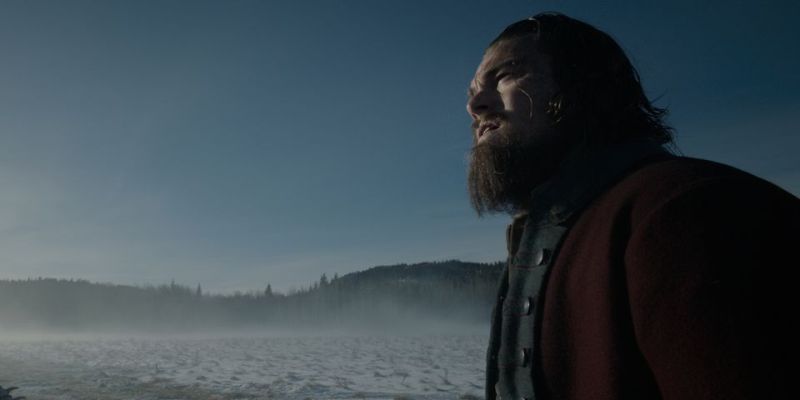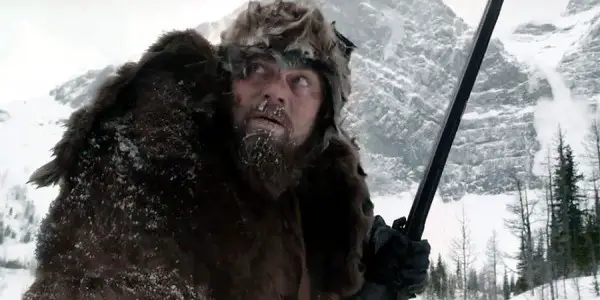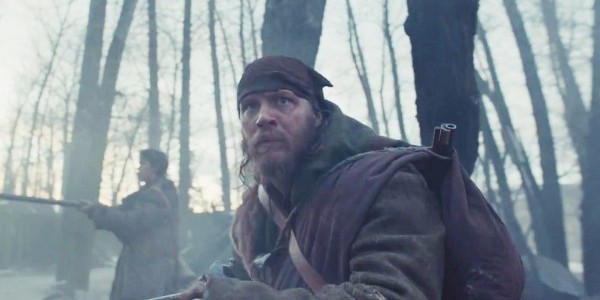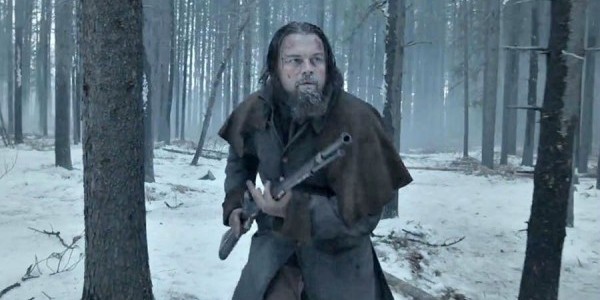THE REVENANT: A Superreal And Raw Film

A bi-product of passion and experimentation gone wrong, Mike has…
I went to the woods because I wished to live deliberately, to front only the essential facts of life, and see if I could not learn what it had to teach, and not, when I came to die, discovered I had not lived. — Walden (Henry David Thoreau)
Set in the remote wilderness of Montana and South Dakota in the 1820s, director Alejandro Iñárritu’s biographical western, The Revenant, follows fur trapper Hugh Glass (Leonardo DiCaprio) and his remarkable quest of survival and retribution. Having been mauled by a bear and left for dead, Glass must find a strength and resolve to overcome the elements and fight his way back to civilization while attempting to have a cathartic release from his experiences. The Revenant is a savage movie about savage people, for those interested in exploring the human condition and existential questions that ponder what it means to be alive on this planet.
Realistic Trappings
Earlier in the winter in 2015, Iñárritu won The Academy Award for Best Picture and Best Director for his faux-play, Birdman or (The Unexpected Virtue of Ignorance). It seemed to have stolen the win away from the frontrunner, Boyhood, and that mostly had to do with Iñárritu’s pioneered attempt to create a new art-form with Birdman. The film behaved like it was one long continuous take, which the movie, itself, referred to as superrealism. The point of the long take/shot was to consciously bridge the gap between fiction and the material world in a quasi-real place in the mind, that would eliminate the two realities and produce an entirely new one in a hyperreal form. It ostensibly worked for The Academy and they bestowed their highest honors upon him.

Continuing Iñárritu’s usage of long shots and extended scenes, The Revenant takes this technique and puts it smack dab in the middle of nature, juxtaposing Birdman’s closed-off interior setting. The Revenant’s approach is to capture the essence of nature, and that doesn’t simply mean of the landscape or surrounding environments, but the conflicting nature of humanity.
Glass (Leonardo DiCaprio) is a barbarian, a man of few words who uses his body to speak as opposed to his fellow trapper, John Fitzgerald (Tom Hardy), who laments the day’s events in whiny and grandstanding monologues. It’s Fitzgerald who abandons Glass to die miserably in the middle of nowhere. The differences between Fitzgerald and Glass are like two sides of a coin, one is all about emotion and the other is contemplative in his thought. And yet, the two men are human and that means they’re framed in flesh.

The real conflict of the film is man’s response to being an entity of the earth, as he is made from dust and to the ground will his body return. But man is also a spiritual being that has a soul and intellect and the pull between these opposing forces is what drives, destroys, and hopefully redeems Glass in his journeys.
There’s also the question of man’s responsibility in governing and stewardship of the land, which has spilled over into the overarching metanarrative that DiCaprio is spinning during the promotion of the film. Bordering on being obnoxious, DiCaprio has been speechifying about man’s rape of the natural world. He’s certainly right about some things but it has mostly come off as fake and pretentious. He seems to be posturing for the sake of winning a coveted Oscar, something The Revenant’s marketing campaign doesn’t want a person to forget about how hard it was for poor Leo.
And yet it’s hard to blame someone for not being enthralled with this project. It might certainly have its flaws and linger on in spots that could be truncated or let go of entirely, but the point of the movie is preservation. Not only of humanity and the earth, but really the one that brings it all together: light. Without light there is literally nothing. There are no boundaries or restrictions, no depth and no form, no colors nor any contrasts in the universe. Without illumination there is no medium of film.
Lights, Camera, Spiritual Awakening
Director of Photography, Emmanuel Lubezki, who collaborated with Iñárritu on Birdman and again for The Revenant, which Lubezki won his second consecutive Oscar for Best Cinematography. Vying for a hat-trick with The Revenant, it most certainly seems auspicious that Lubezki will indeed win again. Having elected to capture the images and visuals in total natural light without the assistance of electricity, The Revenant is an ode to the sun.
The film seems to be rejecting the current Hollywood MO of digital cameras and shafts of bulbous light that are the eliminating the need and want for actual celluloid (though this film did use digital cameras due to the extreme cold requiring it). But the technology used is not the conceit, like it is with Quentin Tarantino’s The Hateful Eight, but rather the source from which all life and light springs. And the work done in this film is absolutely monumental. It’s a huge project and feat to even attempt the type of shots that Lubezki and Iñárritu envisioned, and adding the long and drawn-out methods which they do so further compliments the beauty and jaw-dropping frames. There is no substitute for the real thing Iñárritu implies with his movie, and all the purposeful irony that says and brings with it.

Journeying through harsh nature just to get back home and trying to capture the sun while not burning is basically mythology 101. The machinations of Iñárritu and Lubezki in attempting to trap light and bring it to the people is both Promethian and reminiscent of Daedalus and Icarus.
The harsh suffering that Glass endures, and that the real DiCaprio went through to get the story told, is similar to Sisyphus pushing a boulder up a hill everyday only to come back and to it all over again the next day. There’s also father issues that Glass has with his son (which I will save for the sake of discussing another time), that deals in the archetypal foundations between language and annihilation, mirroring again the difference between Glass and Fitzgerald. The plot is very Dionysian, which in Ancient Greece was the ultimate type of tragic play. And in The Revenant, Glass loses every single thing that he holds dear.
All the tribulations are meant for one thing: for Glass to have a spiritual revelation. Should he accomplish this reoccurring task, as he wants to in dream sequences or possible flashbacks, it will have made the suffering worth it. For pain and torment causes one to see the higher and illuminated ways which are above the natural order of the world. It’s easy and just to get even and to fight an eye for an eye, but it takes understanding to turn one’s cheek and let a greater force deal with wrongdoings and settle scores. It takes light to conquer the darkness and to give meaning where there was only fleshly desires.
Summation
The Revenant is great cap-off to the end of 2015 and bold start for 2016. It’s a wide and large film about intimate life experiences, and the result is one that is thrilling and contemplative. It’s a great view into human baseness, and carves out piercing meaning from the bones of tragedy and physical anguish.
What draws you most to the film? Is it the leading stars or the project’s notoriety for going vastly over-budget and being au naturale as possible?
The Revenant has been playing in limited release since December 25 stateside, and opens wide January 8 in the US. It opens in the U.K. January 15.
Does content like this matter to you?
Become a Member and support film journalism. Unlock access to all of Film Inquiry`s great articles. Join a community of like-minded readers who are passionate about cinema - get access to our private members Network, give back to independent filmmakers, and more.
A bi-product of passion and experimentation gone wrong, Mike has spent most of his time in the field couch surfing and growing a comb-over. Several of his favorite films are Rashomon, Vertigo, Apocalypse Now, and The Naked Gun.













